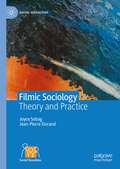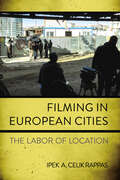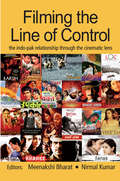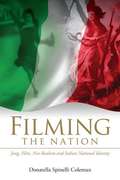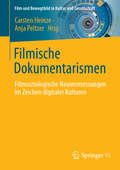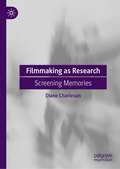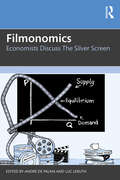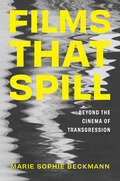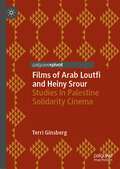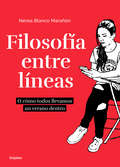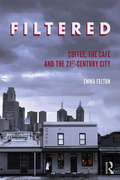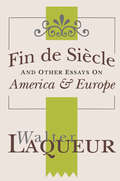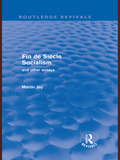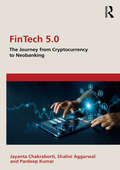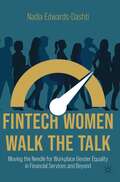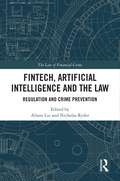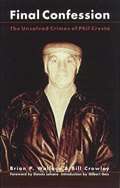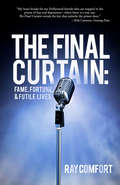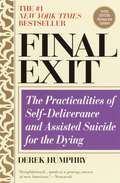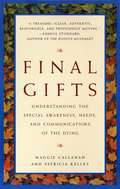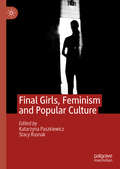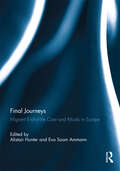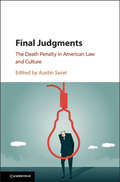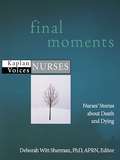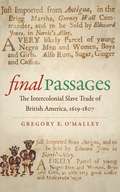- Table View
- List View
Filmic Sociology: Theory and Practice (Social Visualities)
by Jean-Pierre Durand Joyce SebagThis book is an exploration of the intellectual resources offered by the hybridisation of sociology and cinema: practicing sociology, or other human sciences, through images and sound. In the age of the image, the book invites sociological research, not only through the discipline's approach, but also through the joint learning of techniques (shooting and sound recording, derushing, editing, etc.) and film writing. Using concrete examples, the authors analyse what it means to think through the image, explain the different phases of making a sociological documentary, and question, through sociological film, the representations of reality and, more specifically, what remains invisible in the social world. The result is a reflective look at the theories and practices presented, to better equip the sociologist-filmmaker. Illustrated with numerous photographs that mark the history of documentary photography and film, the book is intended for both teachers-researchers and students in all disciplines of the humanities and social sciences who practice video and photography or wish to discover their uses. Students in documentary and film schools, as well as students on information and communication programs will also benefit from the book.
Filming in European Cities: The Labor of Location
by Ipek A. Celik RappasFilming in European Cities explores the effort behind creating screen production locations. Ipek A. Celik Rappas accounts the rising demand for original and affordable locations for screen projects due to the growth of streaming platforms. As a result, screen professionals are repeatedly tasked with chores such as transforming a former factory in Istanbul to resemble a war zone in Aleppo, or finding a London street that evokes Barcelona. Celik Rappas highlights the pivotal role crew members play in transforming cities and locations into functional screen settings. Examining five European media capitals—Athens, Belfast, Berlin, Istanbul, and Paris—the book delves into the overlooked aspects of location-related screen labor and its ability to generate production value. Filming in European Cities demonstrates that in its perpetual quest for authentic filming locations, the screen industry extracts value from cities and neighborhoods, their marginalized residents, and screen labor, enriching itself through this triple exploitation.
Filming the Line of Control: The Indo–Pak Relationship through the Cinematic Lens
by Nirmal Kumar Meenakshi BharatFilming the Line of Control charts out the history of the relationship between India and Pakistan as represented in cinema, especially in light of the improved political atmosphere between the two countries. It is geared towards arriving at a better understanding of one of the most crucial political and historical relationships in the continent, a relationship that has a key role to play in world-politics and in the shaping of world-history. Part of this exciting study is the documentation of popular responses to Indian films, from both within the two countries and among the Pakistani and Indian diaspora. The motive of this has been to locate and discuss aspects that link the two sensibilities — either in divergence or in their coming together. This book brings together scholars from across the globe, as also filmmakers and viewers on to a common platform to capture the dynamics of popular imagination. Reverberating with a unique inter-disciplinary alertness to cinematic, historical, cultural and sociological understanding, this study will interest readers throughout the world who have their eye on the burgeoning importance of the sub-continental players in the world-arena. It is a penetrating study of films that carries the thematic brunt of attempting to construct a history of Indo–Pakistan relations as reflected in cinema. This book directs our holistic attention to the unique confluence between history and film studies.
Filming the Nation: Jung, Film, Neo-Realism and Italian National Identity
by Donatella Spinelli ColemanItalian neo-realism has inspired film audiences and fascinated critics and film scholars for decades. This book offers an original analysis of the movement and its defining films from the perspective of the cultural unconscious. Combining a Jungian reading with traditional theorizations of film and national identity, Filming the Nation reinterprets familiar images of well-known masterpieces by Roberto Rossellini, Vittorio de Sica and Luchino Visconti and introduces some of their less renowned yet equally significant films. Providing an illuminating analysis of film images across a particularly traumatic and complex historical period, Filming the Nation revisits the concept of national identity and its ‘construction’ from a perspective that combines cultural, psychoanalytic and post-Jungian theories. As such this book will be essential reading for all students and scholars of film and psychoanalysis.
Filmische Dokumentarismen: Filmsoziologische Neuvermessungen im Zeichen digitaler Kulturen (Film und Bewegtbild in Kultur und Gesellschaft)
by Carsten Heinze Anja PeltzerDas Buch bietet filmsoziologische (Neu-)Vermessungen aktueller Konfigurationen des Dokumentarischen unter digitalen Bedingungen. Den empirischen Ausgangspunkt bilden die Ausdifferenzierungen und Veränderungen dokumentarischer Praktiken, die sich in ganz unterschiedlichen filmischen Genres beobachten lassen, von True Crime Formaten, Livestreaming-Rollenspielen, Extremsportvideos über das Quality TV bis hin zum klassischen Dokumentarfilm. Daraus erwachsen im Horizont filmsoziologischer Forschungsfelder ganz neue Herausforderungen, die die Bestimmung des Gegenstands wesentlich betreffen. Denn im Zuge dieser Veränderungen werden grundlegende Fragen zum Zusammenhang von filmischer und sozialer Wirklichkeit, Dokumentation und Fiktion, Realität und Irrealität, Wahrheit und Unwahrheit neu gestellt und müssen beantwortet werden. Der vorliegende Band führt in einer konzeptionellen Einleitung den Begriff ‚filmischer Medien‘ ein sowie in die Besonderheiten ihres Verhältnisses zur sozialen Wirklichkeit. Daran anschließend gehen die einzelnen Beiträge den filmischen Transitionen des Dokumentarischen unter digitalen Bedingungen an signifikanten Fällen nach und untersuchen u.a. folgenden Fragestellungen: Zeichnen sich filmische Verfahren der Wahrheit, Aufrichtigkeit, Objektivität oder Echtheit in den Produkten ab? In welchem Verhältnis stehen diese Verfahren sowohl zu den tradierten filmischen Formen des Spiel- und Dokumentarfilms als auch zu den digitalen Logiken der Plattformen? Wie verhält sich das Prinzip der Liveness auf den Plattformmedien zur rekonstruktiven Logik des Dokumentarischen? Und schließlich: Was zeigt die Ubiquität des Filmischen – als Beweis, als Geständnis, als Fälschung, als Unterhaltung, als Artefakt, als Epos oder als Zufall – über die kommunikativen Routinen einer Gesellschaft an? Der Band richtet sich an Medien- und Filmsoziolog*innen, Medien- und Filmwissenschaftler*innen sowie Kulturwissenschaftler*innen. Die Herausgeber PD Dr. Carsten Heinze ist wissenschaftlicher Mitarbeiter für die Lehre an der Fakultät für Wirtschafts- und Sozialwissenschaften an der Universität Hamburg und Mitherausgeber der Reihe "Film und Bewegtbild in Kultur und Gesellschaft". Seine Forschungsschwerpunkte sind Film- und Mediensoziologie, insbesondere dokumentarischer Film, Jugendsoziologie, Jugendkulturen und populäre Musik. Dr. Anja Peltzer habilitiert an der Universität Mannheim mit einer Arbeit zur relationalen Filmsoziologie. Zuvor hat sie an den Universitäten Freiburg, Trier und Mannheim gelehrt und geforscht. Ihre Forschungsschwerpunkte lauten: Film- und Mediensoziologie, Politik und Ästhetik digitaler Kommunikation, Krieg, Rezeptionsforschung und Methoden qualitativer Sozialforschung.
Filmmaking as Research: Screening Memories
by Diane CharlesonThis book examines the challenges often experienced by film practitioners who find themselves researching within the academy, either as students or academics. In light of this the author presents her own journey from practitioner to researcher as a lens. Her practice- based research has been a quest to ”revision” memories, by creating filmic images that elicit memory and remembering. In so doing she has used a range of platforms: multi- screen video installation, still- framing the moving image and remixing found footage. Central to this research has been the importance of family storytelling and sharing, the relationship of the visual and memory, the agency of nostalgia and the role of aura, particularly evident in the re-appropriating of super 8 home movies into a variety of forms. Important to this is has been the relationship of the viewer and the viewed in particular the role of an immersive environment of viewing.
Filmonomics: Economists Discuss the Silver Screen
by André de Palma and Luc LeruthWhat could movies as diverse as The Last Samurai, Cléo from 5 to 7, or Dr. Strangelove have in common? Filmonomics has a simple yet intriguing answer: economics as the main driving force of the plot or as the main motivation of the characters’ actions.This book analyses how movie makers use economic and financial motives in their plots or to build their characters. Have they done it in line with economic theory? Or are they proposing a new angle, a new perspective, that economists should take note of? The authors here do not discuss wages in the film industry or the economics of movies. What interests them is the economic motivations underpinning the behaviour of fictional characters in their favourite films. They argue that credible movie characters can behave in irrational ways, and movie makers occasionally introduce new ideas that economists should take note of.A unique contribution, this book will be of interest to readers eager to discover what economists have to say about films and film directors. It will be indispensable for students and researchers of economics, media studies, film studies, and cultural studies.
Films That Spill: Beyond the Cinema of Transgression
by Marie Sophie BeckmannFilms That Spill is a comprehensive study of the Cinema of Transgression, a hitherto underexamined moment in US underground film culture. Reconsidering the concept of transgressive cinema not only as a description of the intentionally provocative content of the films but also as a feature of a cross-disciplinary practice, Marie Sophie Beckmann explores how filmmaking in the context of the vibrant and intermingling art, music, performance, and film scenes in 1980s Lower Manhattan spilled over the boundaries of artistic disciplines, media formats, and content concepts. This study not only provides a microhistory of these scenes and insight into their afterlife in archives and exhibitions but also represents an innovative contribution to debates within film, media, and visual culture about the methodological and historiographical challenges posed by the expansion of film beyond the discursive boundaries of cinema.
Films of Arab Loutfi and Heiny Srour: Studies in Palestine Solidarity Cinema (Palgrave Studies in Arab Cinema)
by Terri GinsbergThis book places long overdue focus on the Palestine solidarity films of two important Arab women directors whose cinematic works have never received due attention within the scholarly literature or the cultural public sphere. Through an analysis that situates these largely overlooked films within the matrix of an anti-Zionist critique of cinematic ontology, this book offers a materialist feminist appreciation of their political aesthetics while critiquing the ideological enabling conditions of their academic absenting. The study of these daring films fosters a much-needed, sustained understanding of the meaning and significance of Palestine solidarity filmmaking for and within the Arab world.
Filosofía entre líneas: O cómo todos llevamos un verano dentro
by Nerea Blanco MarañonRelatos de filosofía para la vida real. La filosofía está entre las líneas de esta historia tal y como lo está entre nuestros días, en las situaciones más cotidianas, oculta y a la vez a la vista de todos. Nos acompaña desde que nos levantamos con Sartre un lunes por la mañana hasta que gritamos embriagados en un concierto abrazados a la idea del Superhombre de Nietzsche. Este libro descodifica las emociones, miedos y esperanzas de los habitantes del siglo XXI. Nos hace entender nuestro presente y nuestra vida a través del pensamiento crítico. Se trata de un texto afilado, reivindicativo y feminista a ritmo de rock and roll. No es un disco, ni un ensayo, ni una novela, ni una autobiografía, aunque al mismo tiempo es, en realidad, un poco de todo esto. Se tenía que decir y se dijo: la filosofía is not dead.
Filtered: Coffee, the Café and the 21st-Century City
by Emma FeltonCafé culture is flourishing in cities across the world. From London to Seoul, Melbourne to Shanghai and many cities in between, people are flocking to cafés. A recent phenomenon, café culture has made its reappearance only since the end of the 20th century. What is the appeal of the café for urban dwellers? And why now? ‘Having a coffee’ might be a daily ritual, yet it is more than coffee that draws us to the café. Cafés are vital social spaces, technically connected workspaces, and businesses that are forging design and food trends. The café is the lens through which this book explores major changes occurring in everyday life in cities across the world. Urban regeneration has fuelled the growth of urban amenity and social consumer spaces. The impact of technology, social and workplace transformation, and the ascendency of the design and food industries all find expression in the spaces of the cafe. The specialty coffee movement is a thriving, global presence, uniting café staff and customers across geographical borders, with a shared commitment to the connoisseurship of coffee. In the book’s global sweep, it examines the development of café culture in China, Japan and Australia as significant and interesting departures from traditional European café culture. Australia is a world leader and successful exporter of its unique style of coffee and food. Interviews with café patrons and staff illuminate why the café has become a meaningful place for many people in the 21st-century city.
Fin de Siecle and Other Essays on America and Europe
by Walter LaqueurFirst Published in 2018. Routledge is an imprint of Taylor & Francis, an Informa company.
Fin de Siècle Socialism and Other Essays (Routledge Revivals)
by Martin JayFin de Siècle Socialism, originally published in 1988, demonstrates the lively potential for cultural criticism in intellectual history. Martin Jay discusses such controversies as the Habermas-Gadamer debate and the deconstructionist challenge to synoptic analysis. This book should be of interest to students and teachers of modern European history, political and social theory.
FinTech 5.0: The Journey from Cryptocurrency to Neobanking
by Shalini Aggarwal Jayanta Chakraborti Pardeep KumarThis book offers comprehensive knowledge on, and the applications of, the rapidly evolving financial technology landscape. Authored by seasoned experts, it serves as a vital resource for both students and practitioners in the fintech sector.Covering the evolution of cryptocurrencies to the rise of Neobanks and Central Bank Digital Currencies (CBDCs), this volume delves into critical topics such as blockchain, PayTech, LendTech, WealthTech, InsurTech, RegTech and artificial intelligence in finance. It also provides insights into Neobanking and CBDC. Each chapter details the latest trends, challenges, and regulatory frameworks shaping the industry, along with examples and illustrative case studies.Students will benefit from the structured approach that facilitates understanding complex concepts, while practitioners will find real-world applications, case studies, and strategic insights to enhance their professional practices. With a focus on innovation and technology, this book not only prepares readers for the future of finance but also equips them with the tools to navigate and thrive in this dynamic environment. This unique volume is an essential guide to understanding and leveraging fintech advancements, for beginners and experts alike.
FinTech Women Walk the Talk: Moving the Needle for Workplace Gender Equality in Financial Services and Beyond
by Nadia Edwards-DashtiThe FinTech community is steeped in change and has the potential to pave the way for equal opportunities in the workplace, considering the positive actions that have taken place. There is so much more that can be done but what has been achieved so far needs to be replicated. This book showcases the successes in the industry alongside that which could act as a barrier or escalator. Being the first of its kind, FinTech Women Walk the Talk draws upon the author’s podcasts that feature the insights of more than 150 FinTech experts; more than 100 of which are women. It is a call to action for diversity in the workplace, showcasing the successes and presenting how to overcome the challenges. By demystifying FinTech, and highlighting its potential to drive change, this book explores how to achieve gender parity in the workplace. The FinTech industry is used as acase study and hence of interest to practitioners in finance, technology, FinTech and beyond.
FinTech, Artificial Intelligence and the Law: Regulation and Crime Prevention (The Law of Financial Crime)
by Nicholas Ryder Alison LuiThis collection critically explores the use of financial technology (FinTech) and artificial intelligence (AI) in the financial sector and discusses effective regulation and the prevention of crime. Focusing on crypto-assets, InsureTech and the digitisation of financial dispute resolution, the book examines the strategic and ethical aspects of incorporating AI into the financial sector. The volume adopts a comparative legal approach to: critically evaluate the strategic and ethical benefits and challenges of AI in the financial sector; critically analyse the role, values and challenges of FinTech in society; make recommendations on protecting vulnerable customers without restricting financial innovation; and to make recommendations on effective regulation and prevention of crime in these areas. The book will be of interest to teachers and students of banking and financial regulation related modules, researchers in computer science, corporate governance, and business and economics. It will also be a valuable resource for policy makers including government departments, law enforcement agencies, financial regulatory agencies, people employed within the financial services sector, and professional services such as law, and technology.
Final Confession: The Unsolved Crimes of Phil Cresta
by Brian P. Wallace Bill CrowleyJust before he died in Chicago, legendary London-born thief Phil Cresta (1928-95) revealed to Crowley, a retired Boston police detective, how he planned and carried out the capers that had baffled both the police and his colleagues for decades. Sports announcer and columnist Wallace helps him tell the tales. Annotation c. Book News, Inc., Portland, OR (booknews.com)
Final Curtain, The: Fame, Fortune, & Futile Lives
by Ray Comfort"How could any successful, famous person who is rolling in money and who is surrounded by adoring fans be depressed? Happiness comes from what happens to us, and if good things are happening, we should be happy. So why the depression? That is the question that they and we ask ourselves. Why?" The World Health Organization says that 350,000,000 people suffer from depression. God provides answers as to why and how to stop this horrid trend We have been created to be social creatures, and knowing this can help us reach out to those suffering If you are suffering from depression or know someone who is, this book can help you find hope *Bonus Book included in the back "From the Ledge" From his bird’s eye view, he peered into the foggy bay, as if his solution might be out there just beyond his sight. Why was he hesitating to take his life? All he had to do was lean forward from the railing and simply free fall into the treacherous depths below, yet he felt as compelled to stay as he did to jump. Will the bystander approaching him be able to address the man’s true needs and talk him down? Would you be able to offer a ray of hope and some comfort to someone without any? Let this fictional encounter provide a way to reach those who walk on that ledge, needing the hope of God.
Final Exit: The Practicalities of Self-deliverance and Assisted Suicide for the Dying (3rd edition)
by Derek HumphryThe first edition offered people with terminal illness a choice on how and when to end their suffering. This revised and updated third edition goes far beyond the original to provide new information about the legality of the personal issues involved.
Final Gifts: Understanding The Special Awareness, Needs, and Communications of the Dying
by Patricia Kelley Maggie CallananThe authors provide a compassionate and readable book to help both those who are dying and those who are providing care for them. The authors (hospice workers) gently address common stages experienced by those who are terminally ill. A highly useful book.
Final Girls, Feminism and Popular Culture
by Katarzyna Paszkiewicz Stacy RusnakThis volume examines contemporary reformulations of the ‘Final Girl’ in film, TV, literature and comic, expanding the discussion of the trope beyond the slasher subgenre. Focusing specifically on popular texts that emerged in the 21st century, the volume asks: What is the sociocultural context that facilitated the remarkable proliferation of the Final Girls? What kinds of stories are told in these narratives and can they help us make sense of feminism? What are the roles of literature and media in the reconsiderations of Carol J. Clover’s term of thirty years ago and how does this term continue to inform our understanding of popular culture? The contributors to this collection take up these concerns from diverse perspectives and with different answers, notably spanning theories of genre, posthumanism, gender, sexuality and race, as well as audience reception and spectatorship.
Final Journeys: Migrant End-of-life Care and Rituals in Europe
by Alistair Hunter and Eva Soom AmmannA recurring theme of the public discourse on immigration in Europe today is that migrants are primarily young people, of working age. Against this short-sighted view, the main contribution of this book is to propose that processes of ageing and dying constitute a critical juncture in the settlement of migrant-origin communities, precipitating novel intercultural negotiations in societies characterized by post-migration diversity. Bringing together seven studies reflecting different institutional and (trans)national contexts, the chapters fall under two main themes. A key issue when facing death is the organization of adequate care for the dying, which may be a challenging task in pluralized settings involving both migrant patients and migrant carers. Facing the end of life furthermore involves the practice of rituals in order to make sense of the transition from life to death. Whether through care or ritual, the studies presented here show that the need to reconcile different cultural, religious and administrative norms relating to death is infused with ontological insecurities which may result in new or renewed interrogations of identities and belongings. This book was originally published as a special issue of the Journal of Intercultural Studies.
Final Judgments: The Death Penalty in American Law and Culture
by Austin SaratFinal Judgments: The Death Penalty in American Law and Culture explores the significance and meaning of finality in capital cases. Questions addressed in this book include: how are concerns about finality reflected in the motivations and behavior of participants in the death penalty system? How does an awareness of finality shape the experience of the death penalty for those condemned to die as well as for capital punishment's public audience? What is the meaning of time in capital cases? What are the relative weights according to finality versus the need for error correction in legal and political debates? And, how does the meaning of finality differ in capital and non-capital (LWOP) cases? Each chapter examines the idea of finality as a legal, political, and cultural fact. Final Judgments deploys various theories and perspectives to explore the death penalty's finality.
Final Moments
by Deborah Witt ShermanWhat was it like the first time a nurse witnessed death? How do nurses cope with death when it becomes almost routine? What lessons can we learn from their experiences? Twenty-five nurses--from hospitals, private practices, and in home health care--tell about their experiences with death. Hear from people new to the field as well as those who have been in nursing for decades about how they deal with grief, the controversies about end-of-life decisions, the challenges of caring for people as they die, and the harrowing experience of telling their family members. Edited and introduced by a registered nurse, the book is a resource for both nurses and anyone who wants to better understands death and dying.
Final Passages
by Gregory E. O'MalleyThis work explores a neglected aspect of the forced migration of African laborers to the Americas. Hundreds of thousands of captive Africans continued their journeys after the Middle Passage across the Atlantic. Colonial merchants purchased and then transshipped many of these captives to other colonies for resale. Not only did this trade increase death rates and the social and cultural isolation of Africans; it also fed the expansion of British slavery and trafficking of captives to foreign empires, contributing to Britain's preeminence in the transatlantic slave trade by the mid-eighteenth century. The pursuit of profits from exploiting enslaved people as commodities facilitated exchanges across borders, loosening mercantile restrictions and expanding capitalist networks.Drawing on a database of over seven thousand intercolonial slave trading voyages compiled from port records, newspapers, and merchant accounts, O'Malley identifies and quantifies the major routes of this intercolonial slave trade. He argues that such voyages were a crucial component in the development of slavery in the Caribbean and North America and that trade in the unfree led to experimentation with free trade between empires.
